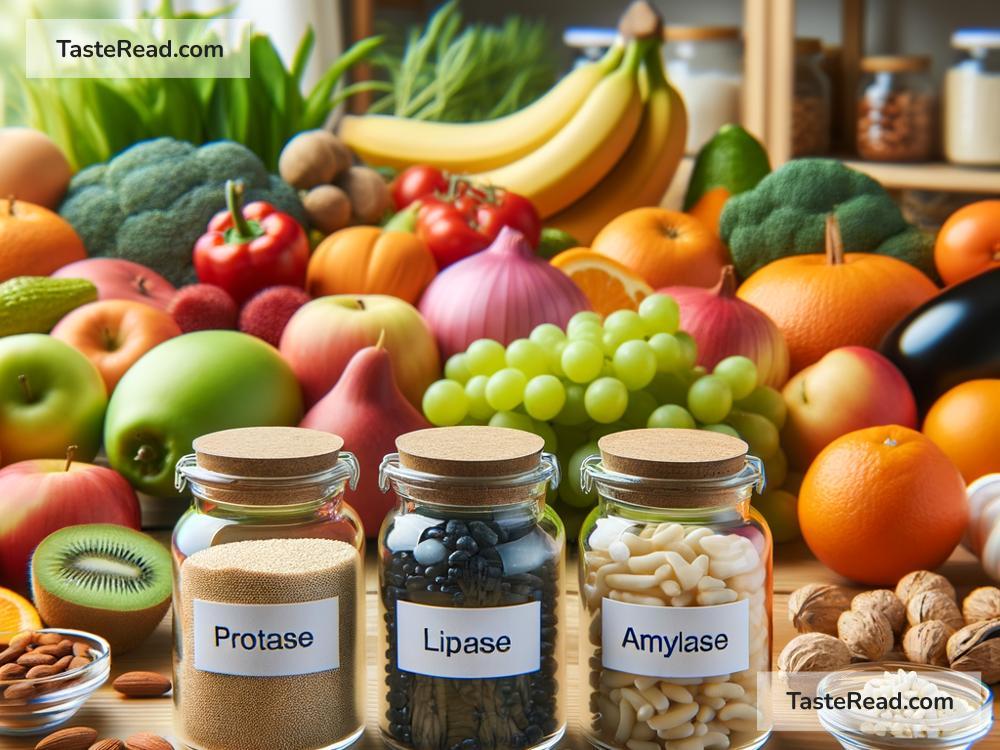Understanding the Role of Dietary Enzymes in Health
In our everyday lives, we hear a lot about healthy foods, vitamins, and minerals. But one topic that doesn’t get enough attention is dietary enzymes—tiny but powerful helpers that play a key role in how our bodies digest food and stay healthy. In this blog, we’ll break down what enzymes are, why they matter, and how you can support your enzyme activity for better health.
What Are Dietary Enzymes?
Dietary enzymes are special proteins found in certain foods that help break down the foods we eat. Think of them as tools your body uses to “unlock” the nutrients in food and make them usable for energy, growth, and repair. Without them, your body would have a hard time digesting food and absorbing the nutrients it needs.
There are three main types of enzymes that play a role in digestion:
- Amylase: Helps break down carbohydrates, like those found in bread, pasta, and fruits, into smaller sugar molecules.
- Protease: Breaks down proteins in foods like meat, beans, and eggs into amino acids.
- Lipase: Helps digest fats, like those in oils and dairy products, into fatty acids.
These enzymes are naturally made by your body, mainly in the saliva, stomach, pancreas, and intestines. However, some foods contain their own enzymes to help jump-start digestion, which can be extremely beneficial for your health.
Why Are Enzymes Important for Health?
Enzymes might seem like small players, but they have big impacts on your overall health. Here’s why:
1. Better Digestion
The most obvious role of enzymes is to help your body break down food. Without the right enzymes, you might experience indigestion, bloating, or other digestive troubles. For example, people who have lactose intolerance lack the enzyme lactase, which is needed to digest the lactose (natural sugar) in milk. Consuming foods with natural enzymes or taking enzyme supplements can sometimes help improve digestion.
2. Nutrient Absorption
Enzymes ensure that the nutrients in your food are broken down into their simplest forms so your body can absorb them properly. If your body can’t absorb nutrients well, it can lead to deficiencies, even if you’re eating a balanced diet. Enzymes keep your nutrient absorption process running smoothly.
3. Energy Production
When food is properly digested and nutrients are absorbed, your body uses these nutrients to produce energy. Enzymes make sure you’re not just eating food but actually benefiting from it. Without enough enzymes, you might feel sluggish or tired, even if you’re eating healthy meals.
4. Gut Health
Your gut health is closely tied to enzyme activity. A lack of enzymes can make the digestive process slow or incomplete, allowing undigested food to sit in your stomach or intestines. Over time, this can lead to discomfort, gas, or imbalances in gut bacteria—which could ultimately lead to more serious health issues.
5. Reduced Inflammation
When food isn’t digested properly, it can irritate the gut and trigger inflammation in the body. Enzymes help prevent this by ensuring that food is thoroughly processed. Some enzymes, like bromelain, found in pineapples, are even known to have anti-inflammatory properties that can support overall health.
Foods That Are Rich in Enzymes
Fortunately, nature provides us with plenty of foods that contain natural enzymes. Incorporating these into your diet can help lighten the workload for your body’s own enzyme production. Here are some enzyme-rich foods:
- Pineapples: Contain bromelain, an enzyme that helps digest protein and may also reduce inflammation.
- Papayas: Loaded with papain, which supports protein digestion.
- Bananas: Contain amylase and maltase, which help digest carbohydrates.
- Avocados: Include lipase, an enzyme that helps break down fat.
- Fermented Foods: Foods like yogurt, sauerkraut, and kimchi are rich in enzymes and probiotics, which support digestion and gut health.
- Raw Honey: Contains a variety of enzymes that help break down sugars.
- Sprouted Grains and Seeds: Sprouting activates enzymes that make the nutrients in grains and seeds easier to digest.
However, cooking can destroy some of the enzymes in these foods, so eating them raw or lightly cooked is best to preserve their enzyme activity.
Can You Take Enzyme Supplements?
Some people may not produce enough enzymes naturally, which can lead to poor digestion or other health issues. This can happen due to aging, certain health conditions, or high levels of stress. In these cases, enzyme supplements can sometimes be helpful. These are available in capsule or powder form and usually include specific enzymes for digesting carbs, proteins, or fats.
Always consult your doctor before taking enzyme supplements, especially if you have a medical condition, as they are not one-size-fits-all.
How to Support Your Body’s Own Enzymes
Your body already works hard to produce enzymes, and you can support this process in several ways:
- Eat a Balanced Diet: A diet rich in fruits, vegetables, whole grains, and proteins will give your body the nutrients it needs to produce enzymes.
- Chew Your Food Properly: Digestion starts in your mouth, where saliva releases enzymes like amylase.
- Stay Hydrated: Water is essential for keeping your digestive system running smoothly.
- Avoid Overeating: Eating too much at once can overwhelm your body’s enzyme production.
- Limit Processed Foods: These often lack enzymes and can make digestion harder.
Final Thoughts
Dietary enzymes may not get as much attention as vitamins or minerals, but they are just as important for your health. By understanding their role and including enzyme-rich foods in your diet, you can improve digestion, boost energy, and support overall wellness. Whether it’s a fresh slice of pineapple or a bowl of yogurt, simple dietary changes can go a long way in keeping your enzymes and your health in good shape.
Take care of your enzymes, and they’ll take care of you!


